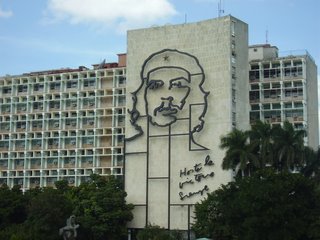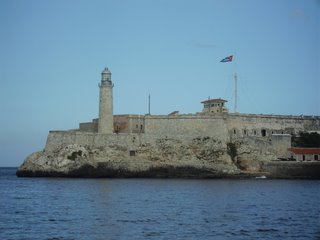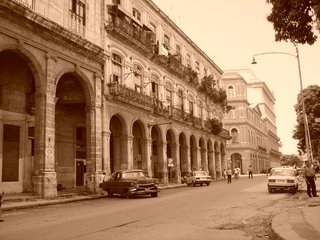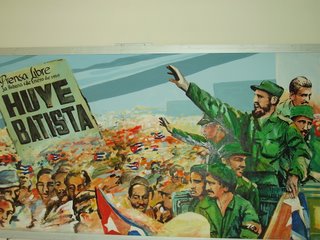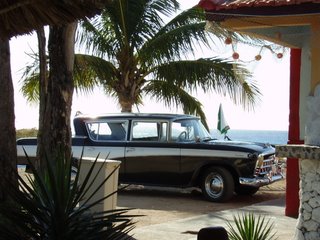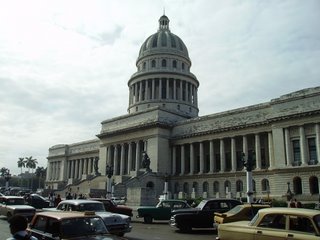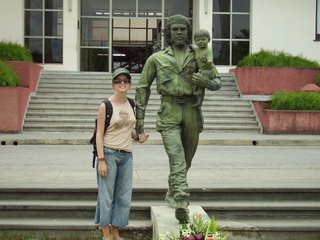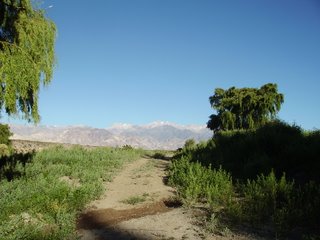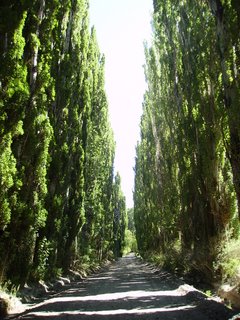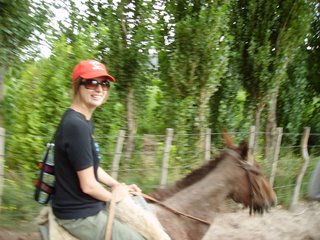Wednesday, January 31, 2007
Friday, January 19, 2007
Argentina

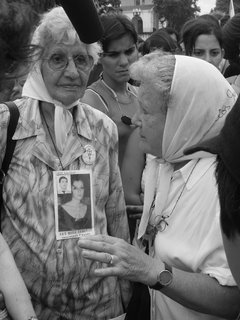

During the dictatorship from 1976 - 83 over 30000 people were "disappeared". The Madres de Plaza de Mayo still protest every Thursday afternoon demanding that the people who stole their children be brought to justice. Recently some of the perpetrators have been brought to trial but disturbingly this has been accompanied by a resurgence of the practices of intimidation and brutality of the Dirty War. Julio Lopez a key witness in the trial of a former police chief went missing last September and has still not been found. In December another witness was kidnapped, beaten and burnt before his captors released him. Hundreds of other activists and torture survivors have received death threats in recent months. Read this article by April Howard for more info
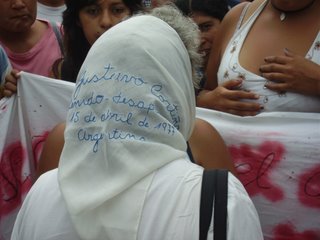 ===============================
===============================Scary as they are, the echoes of dictatorship don´t prevent Buenos Aires from being an amazing and vibrant city and we had a fantastic time checking out the cafes, bars and galleries. Big thanks to Patrick and Franci and flatmates for putting us up in the heart of San Telmo. Tonight we head to Mendoza for more yummy wine and then down to Santiago from where we fly home. Sad the adventure is ending but looking forward to seeing everyone again and of course planning the next adventure...
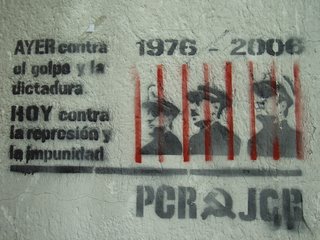 "yesterday against the coup and the dictatorship, today against repression and impunity"
"yesterday against the coup and the dictatorship, today against repression and impunity"
"the streets are ours"

"for bread and work"

Simon´s finally agreed to take dancing lessons, here we are performing in La Boca.
Saturday, January 13, 2007

Developments in Venezuela
We've been so excited by the announcements Chavez has made in the last few days but we've been shocked by some of the outrageous articles in the mainstream international press. We're guessing the same lies will be being repeated by the Packer and Murdoch press back home so we're posting this excellent article by Eva Golinger which sets the right wing journos straight.
Confused About Venezuela?
Saturday, Jan 13, 2007
By: Eva Golinger - Venezuelanalysis.com
Over the past few days, major newspapers in the United States, such as The New York Times, The Washington Post, The Los Angeles Times and The Wall Street Journal, have published editorials aggressively and harshly criticizing recent declarations and decisions made by re-elected President Hugo Chávez and his cabinet. A large percentage of the content of these editorials, which reflect the viewpoints of the newspapers, are based on a distortion and misconception of new policies being implemented in Venezuela and the overall way government is functioning. In the Washington Post’s “Venezuela’s Leap Backward”, published on January 10, the editorial board intentionally and mistakenly portrays the recent presidential elections this past December in Venezuela as illegitimate and unfair. By falsely claiming that Chávez conducted a “one-sided campaign that left a majority of Venezuelans believing they might be punished if they did not cast their ballots for him”, the Post wants its readers to think Venezuelans who voted for Chávez did so under duress and fear. Nothing could be further from the truth. A majority of Venezuelans publicly express their sincere admiration and approval of President Chávez in an open and fearless way on a daily basis in this country. Most Venezuelans believe Chávez is the best president the nation has ever had, and statistics prove that his government has built more bridges, railroads, hospitals, clinics, universities, schools, highways and houses than any administration in the past. The Post editorial also attempts to downplay the “only 7 million votes” Chávez received, not mentioning that those seven million votes represent more than 63% of total votes – a landslide victory to the opposition candidate’s 37% - and that no president in Venezuelan history has ever, ever received such a large number of votes in an election.
The New York Times editorial, also published on January 10, attacks a recent statement made by President Chávez regarding the nationalization of one telephone company, CANTV, and an electric company. However the Times doesn’t explain that the CANTV is the only non-cellular telephone company in the country, giving it a complete monopoly on national land-line telecommunications and control over a majority of Internet service as well. Furthermore, the CANTV was privatized only in 1991, during the second non-consecutive term of Carlos Andrés Pérez a president later impeached for corruption who implemented a series of privatization measures, despite having run for office on a non-privatization platform just three years before. In fact, as soon as Carlos Andrés Pérez won office in 1988 after convincing the Venezuelan people he would not permit “neo-liberalism” on Venezuelan shores, he immediately began to announce the privatization of several national industries, including telecommunications, education and the medical and petroleum sectors. This deception led to massive anti-privatization protests during February 1989 during which the government ordered the armed forces to “open-fire” on the demonstrators and arrest and torture those not killed. The result was the “Caracazo”, a tragic scar on contemporary Venezuelan history that left more than 3,000 dead in mass gravesites and thousands more injured and detained. The re-nationalizing of Venezuela’s one landline phone company is a strategic necessity and an anti-monopoly measure necessary to ensure that Venezuelans have access to telecommunications service. (Take it from someone who lives here. You can’t even get a landline if it isn’t already installed in your residence. The waiting list is over 2 years and you have to bribe someone to actually do the job). And furthermore, the new Minister of Telecommunications, Jesse Chacón, announced that any company “nationalized” will be fully compensated for its shares and property at market value.
The third issue put forth in the editorials is the recent announcement by President Chávez that the license of private television station RCTV to operate on the public airwaves is up for review in May 2007 and most likely will not be renewed. The government has based its denial of the license renewal on RCTV’s lack of cooperation with tax laws, its failure to pay fines issued by the telecommunications commission, CONATEL, over the past twenty years, and its refusal to abide by constitutional laws prohibiting incitation to political violence, indecency, obscenity and the distortion of facts and information. The public airwaves, as in the case of the United States, are regulated by government. Television and radio stations apply for licenses from the telecommunications commission and are granted those licenses based on conditional compliance with articulated regulations. When a station does not abide by the requirements, it generally is fined and warned, repeatedly, until compliance is assured. In the specific case of RCTV, the station and its owner, multi-millionaire Marcel Granier, have refused to comply with the law and have continued to abuse and violate the clear and concise regulations that are supposed to guarantee Venezuelan citizens their constitutional right to “true and accurate information” (Article 58 of the Constitution).
RCTV’s owner, Marcel Granier, played a key role in the April 2002 coup d’etat against President Chávez and has used his station to engage in an ongoing campaign of anti-Chávez propaganda and efforts to destabilize the nation through distorting and manipulating information to create panic, apathy, fear and violence in Venezuelan society. The station’s clear violations of the telecommunications regulations and the Constitutional guarantees that protect freedom of speech and access to true and accurate information provide sufficient reason to deny the renewal of its license to use the public airwaves. Unlike the editorial board of the Los Angeles Times (Fidel Chávez?, January 11, 2007) mistakenly claims, Chávez and his government are not “shutting down” the private media station. RCTV can continue to operate on the private airwaves, i.e. cable and satellite television. As would be the case in any country where law and order are respected, RCTV will not receive a renewal on its license to remain on the public airwaves because it repeatedly violated the law during more than a decade.
Unfortunately, international groups that allegedly protect freedom of the press and of speech around the world, have fallen under the influence and manipulation of RCTV president Marcel Granier, who through his close relationship with Washington, is conducting a campaign to defend his station by user the banner of freedom and liberty. But consistent lawbreakers and coup leaders should not receive the support of international press watchdog groups and human rights defenders. Rather, those groups should praise the decision of the Venezuelan government to maintain the public airwaves in the hands of the public. The license so abused by RCTV will most likely be granted to various community and alternative media groups and stations in Venezuela that have emerged over the past few years as a result of the direct encouragement and support of the Chávez administration.
Finally, the editorials in the Post, the New York Times, the Los Angeles Times and the Wall Street Journal, all criticize President Chávez’s announcement to create a new political party in Venezuela: the United Socialist Party of Venezuela. The editorials inaccurately claim that Chávez will dissolve all political parties in the country and allow only one party to operate. This is a dangerous and false inference. What Chávez really declared was the formation of a new revolutionary party that would be open to all parties that support the revolution. There will be no closing down or abolishing of other political parties in the nation; they can all remain as they wish and those that choose to merger or support the new party can also freely do so. Furthermore, Chávez indicated that the reason for the designing of a new political party is to break free from the old corrupt hierarchical party structures of the past that concentrate power in the hands of few and exclude and ignore the vast majority of supporters. Chávez remarked that the new party he seeks to promote will be formed by grassroots community movements, and that there will be no power structures that isolate and marginalize constituents.If you only read the US press, you must be very confused about Venezuela. The extreme levels of distortion, lack of fact checking and source verification and outright manipulation of information in the US media on Venezuela is quite troubling and dangerous in a nation that has waged wars based on false data and misleading policies.
Sunday, January 07, 2007
Memories and Images of Revolutionary Cuba
Internet is very expensive in Cuba in comparison to the rest of Latin America so we haven´t been able to update our blog in the last few weeks. We want to apologise to the many 100´s of our avid readers worldwide who have sent us countless emails explaining that their lives have been empty and meaningless without our hard-hitting, incisive and informative blogsite entries. In the month that we have remaining in Latin America we pledge to do our darndest to satisfy the ever increasing desire for information.
After the highs and highs of our participation in the Venezuelan solidarity brigade we were very keen to get to Cuba and try to compare the two revolutions. We managed to see a fair bit of Cuba in the 3 weeks but both of us have decided that this fascinating and inspiring little nation if definetly worth a second, much longer, trip.
Highlights included the vast Museum of the Revolution in Havana, walking along Havana´s famous Malecon (sea wall), visiting the very moving Che Guevara monument in Santa Clara, the UNESCO world heritage protected town of Trinidad with its well preserved colonial architecture and the walking through the small house in Central Santiago were the famous revolutionary brothers and underground movement leaders Frank and Jose Pais) grew up in Santiago de Cuba.
The 46 year old economic blockade on Cuba illegally enforced by the US has certainly had its negative effects on Cuba. The shortage of building materials and resources is evident in the neglected state of many of the buildings and apartments. But even in the depths of Cuba´s special period Cuba not only managed to survive but survived with the key gains of the revolution intact. Not one hospital bed or school has been closed and Cuba today has the best health, education and social services in the third world (and is better than many first world countries including the United States).
Despite the sabotage, assassinations, invasions and ecomonic warfare Cuba has been subjected too as punishment for choosing to follow a different economic and social path from that dictated by the White House and the Pentagon the grassroots base of the revolution appeared to be very strong. Committees for the Defense of the Revolution (CDR´s) are voluntary mass organisations with a membership of around 4 million people (out of a total popualtion of 11 million). The activity of the CDR´s were hard to miss walking down the streets of Cuba´s cities and towns. Their major campaign revolves around support for the return of the Cuban Five. The Cuban Five are currently held in US prisons as foreign spies for attempting to gather information on extremist Cuban exile groups based in southern Florida and prevent future terrorist attacks on Cuba.
To find out more about this
important
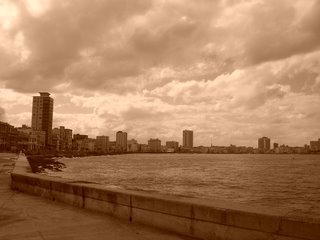 cause visit
cause visit 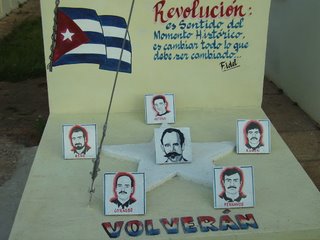 www.fr
www.fr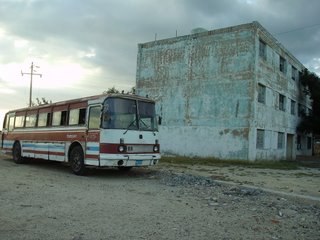 e
e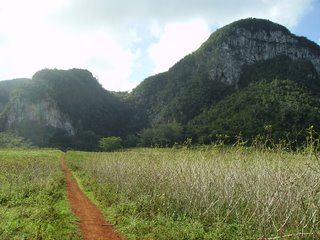 et
et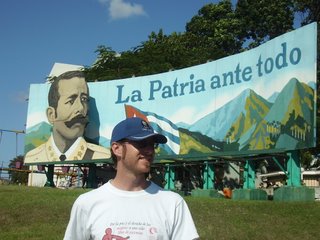 hefive.org/
hefive.org/